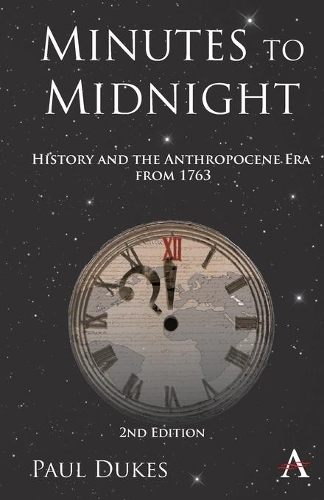
Minutes to Midnight, 2nd Edition
(Paperback)
Publishing Details
Minutes to Midnight, 2nd Edition
By (Author) Paul Dukes
Anthem Press
Anthem Press
30th October 2020
United Kingdom
Classifications
Professional and Scholarly
Non Fiction
363.7387
Physical Properties
Paperback
204
Width 140mm, Height 216mm, Spine 26mm
454g
Description
Minutes to Midnightexamines the evolution of the predicament symbolised by the setting of the Doomsday Clock at a few minutes to midnight in the context of the Anthropocene Era from 1763, making special reference to the study of history throughout the period.
It seeks to demonstrate the necessity for history as science, pointing out the inadequacy of some previous approaches. It argues for a pandisciplinary approach to today's crisis.
Reviews
Minutes to Midnight is a profoundly erudite and original work, formidable in intellectual scope and bristling with insight. It should be essential reading for anyone who wants to understand the contemporary world and the role of history.' Dr Murray Frame, University of Dundee
At last, a historian with the courage and vision to shake us out of our postmodernist torpor. Dukes grand tour from the tentative experiments of James Watt to nuclear twilight and climate catastrophe starkly reminds us how quickly we have come to the edge of our own anthropogenic abyss.' Dr Mark Levene, University of Southampton
Paul Dukes has written a significant book, arguing that we live in a new geological age, one that was and continues to be shaped in the most profound way by humankind. The world is ours in a way that it has never been before, and we can thank Paul Dukes for telling us so, and suggesting what new responsibilities this ownership entails.' Professor Marshall Poe, University of Iowa
Professor Dukes unique capacity for global analysis across centuries has with penetrating brilliance examined the topic of our times, the roots of the ecological crisis. This is engaged history from an outstanding historian; an absolute must read.' Professor Ian D. Thatcher, University of Ulster
Author Bio
Born in Wallington, Surrey in 1934, Paul Dukes has history degrees from Cambridge, 1954, Washington, 1956 and London, 1964. He has been associated with Aberdeen University since 1964, with visiting appointments at Auckland and Cornell. He is the author of a wide range of publications on Russian, European and world histories.
